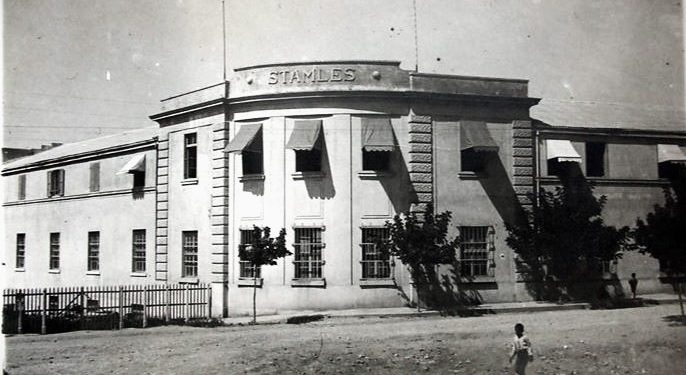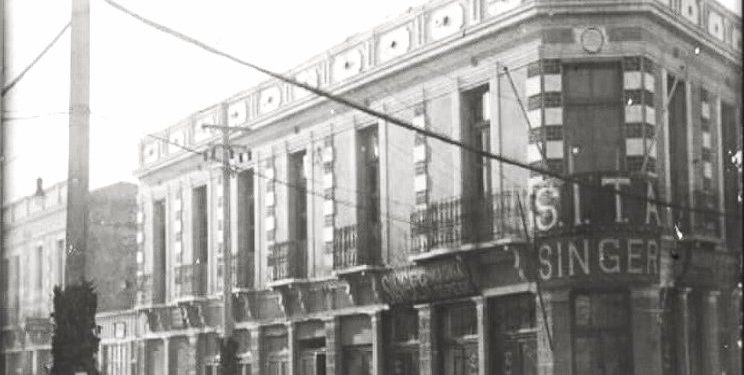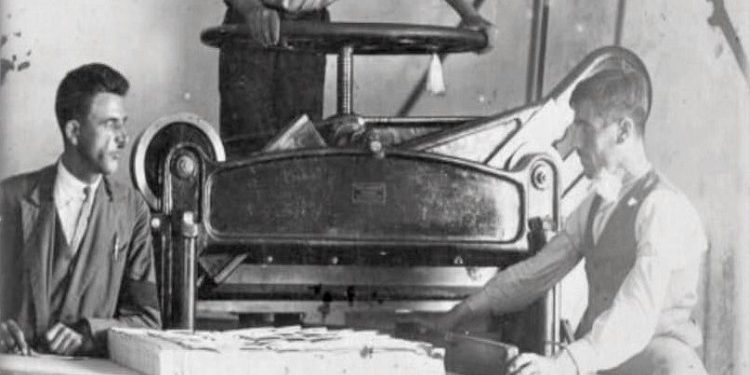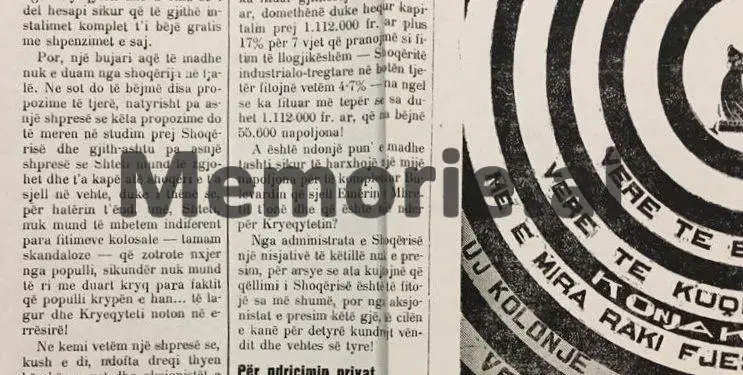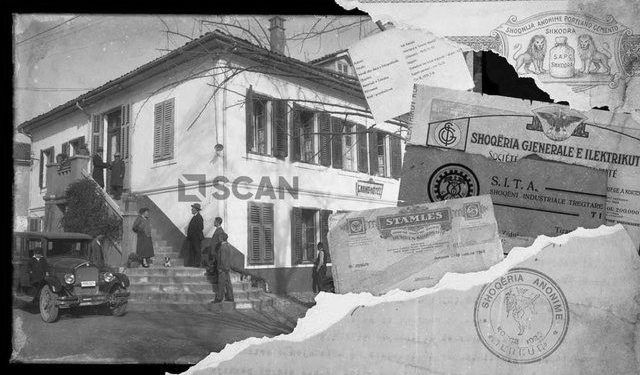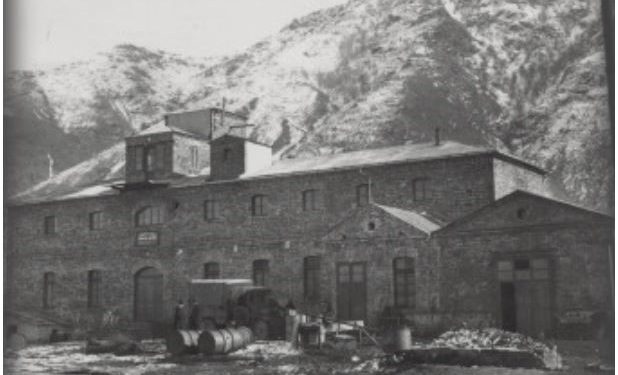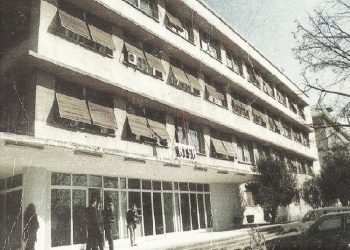By Kreshnik Kucaj
Memorie.al / The practice of establishing companies with joint capital and shares is a practice that in Albania saw the greatest development in the 20s. In this period, we have a series of cases, when Albanian entrepreneurs pool their money, for the creation of different joint stock companies. In this period, there are also foreign companies that come to Albania for the use of natural resources, against the approval of the relevant concessions. In the study of well-known economists, Iljaz Fishta and Muharrem Doçi, on the intervention of Italian capital in Albania in the period 1925-1944, it is evident that; although the country was backward, in the 20s, more organized forms of enterprises began to emerge, such as joint stock companies, cartels, etc. In this period, there was a strong confrontation for the market, between Albanian companies and foreign companies.
The first Albanian joint stock companies
“Free Vlora” was established in 1921 as an anonymous company, which carried out the activity of loading and unloading, in the port of this city. In later years, the number of capitalist companies created with domestic capital increases. In 1923, the “STAMLESS” society was created, based in Durrës, in 1925, the “General Electric Society” was created, in 1926; the Anonymous Society “Mërkur” was created, based in Korça. In 1927, several joint stock companies were created in Tirana, where the most famous was the company ‘SITA’, in Shkodër the company “Portland Cemento Shkodra” was created, in Elbasan the company “SAIDE”, in Sarandë the company “DRINOS”, etc.
Referring to the figures published in the study of the two economists, during the year 1927 alone, 2.5 million gold francs were invested in regularly established joint-stock companies, in addition to another 1 million gold francs invested in joint-stock companies that were not regularly established. .
GENERAL ELECTRIC COMPANY OF KORCA
It was created in 1925, by a group of Albanian entrepreneurs. Its center was in the city of Korça and the initial capital of this company was 200 thousand gold francs, but in later years it increased, reaching 800 thousand gold francs.
The founders of this society were; Llambi Mano, Pando Mulla, Llambi Bimbli, the Qirjako brothers, Mihal and Vasil Fundo, Selim Mborja, etc. This company focused its activity mainly in the electrical sector and running a powerful flour mill. This company received the concession for the construction of the Vithkuqi power plant, for the supply of Korca with electricity.
Until that period, electricity was produced by fuel-burning engines, and unlike before, this company started producing electricity from water, for the first time in Albania. In these conditions, there were quite a few debates with the residents of the area, due to the fact that several mills that worked with water had to be closed. After debate, it was agreed that the mills would switch to production using electricity.
The company signed its charter, which stipulated that its duration would be 50 years. The capital of the company was 200 thousand gold francs, divided into 200 ordinary shares. The statute bore the signature of the founders; Pandeli Mulla, Dhimitër Bimbli, Dhimitër Fundo and Selim Mborja, all residents of Korça. The witnesses were lawyer Thoma Orollogaj and Hysen Dvorani. The company operated until the Second World War, where at its end, it was nationalized and passed into state administration.
STAMLES (Anonymous Trading Society for the Monopoly of Cards and Matches), was created in March 1923, by a group of Albanian entrepreneurs, headed by Jusuf Beshiri. The center of this company was in Durrës. The initial capital was 186 thousand gold francs, but that would increase in the later period. Together with SITA, this was among the first joint-stock companies with local capital.
This company focused its activity on exercising the monopoly of cigarette paper and matches, on the production of tobacco and cigarettes, as well as on the production and sale of electricity. This company was created as part of a government project to monopolize playing cards, matches and packaged cigarettes.
During the period of the Ottoman Empire, tobacco was a state monopoly, administered by the Ottoman Public Debt Administration, but after the declaration of Independence, the monopoly passed into the hands of the Albanian state. At the end of the First World War, the government decided to give it a concession, also to fight smuggling.
The company itself had strong clashes with the state authorities during the concession period. However, this company produced some of the most famous cigarette packs of the time.
Also, this company extended its activity to the production of electricity, where it received the concession to supply the city of Durrës with electricity. At the end of World War II, the tobacco manufacturing company was nationalized and named the enterprise; N.I.SH. Durrës “Telat Noga” cigarettes.
SITA-Anonymous Industrial Trade Society
One of the most important efforts in this direction was in 1927, the year when the most powerful Albanian businessmen joined in a joint venture, named SITA – Industrial Trade Society Anonymous. The group of Albanian businessmen of this venture was headed by Aleksandër Hobdari, one of the most popular businessmen of the time. Koço Kota, Milto Tutulani, Pandeli Vangjeli, Xhemal Vrioni, etc. were part of this group. All the shareholders of this company were senior politicians and activists known for national issues.
The center of this society was in Tirana. According to the statute, this company could develop different activities, but based on the concessions received by the Albanian government of that time, it developed industrial and commercial activity in two main directions; in the production, distribution and sale of salt throughout the country and in the production and sale of electricity in Tirana.
The company “SITA” had its headquarters in Tirana. It was founded with an initial capital of 1 million gold francs. Later, it made two new share issues, increasing the capital to 2.2 million gold francs. The company had 4,400, each nominative, having a value of 500 gold francs each. Based on a provision of its charter, the shareholders could only be Albanian citizens and for this reason, the company was formed and remained with simple national capital.
In this way, by establishing the condition of having only Albanian shareholders, the company intended to maintain a nationalist spirit. For the first time, Shkodra’s natural potential to produce cement was discovered during the Austrian occupation, where some technicians proved that in the mountain of Tarabos, there were stones from which the valuable material for construction could be extracted. Later, some merchants of Shkodra would take the initiative to collect some samples and send them for laboratory analysis, from which the results would be positive.
The geographical position was favorable as it enabled transportation through sea routes to the country’s ports. Since the Buna was a navigable river and the factory could be set up on the river bank, the product could be easily transported by the boats of the Ulcinians, to all the piers of Albania, at a low price. For the establishment of the factory, 700 thousand gold francs would be invested, part of which would be the investment of traders and, another part, of ordinary individuals who had bought shares in the Albanian company.
The factory would start production normally and the beginnings would be positive for the shareholders of the cement company. However, outdated and unsuitable machines for the development of the company would cause it to produce below its potential and maintenance would have high costs, which negatively affected profits.
In order to increase the production capacity of the factory, the administrative council of the company would request the expansion of the capital. And in this case, Fazlli Ademi, owner of the famous tobacco factory, “Taraboshi”, would join as a shareholder of the company. The latter, in order to improve the condition of the factory, decided to join the company, investing 100 thousand gold francs. But again the company would not be able to perform well and would block the works, twice.
In these conditions in 1933, a German company (‘MIAG’) would express interest in supporting the factory, to reach the production capacity of 600 tons per day. On the other hand, the government in 1935 would also undertake fiscal relief to support the operation of the factory, removing customs taxes for the raw materials needed for the processing of the material. The capital of the factory would reach 1.2 million gold francs, while its production would meet the country’s needs for the time being. The factory would continue its activity until the moment of nationalization, after the Second World War.
Anonymous Society “Wednesday” in Korça
It was created in 1926 in Korça, by various entrepreneurs. It operated in the field of alcohol production. The president of this society was Vasil Andrejev. In the list of shareholders of this company, there were also the family members of the manager, Fedor Andrejev, Ana Andrejev, as well as Albanian businessmen, Gaqo Turtulli, Vasil and Petraq Katro, etc.
Its other shareholders were Pandi Mulla and Llambi Mano, who simultaneously owned shares in the general electric company of Korça. The shareholders of this company had sufficient capital and came to increase it, in accordance with the needs of the market. Very soon the company would be the first in the local market.
“Nikaj e shoke” society in Shkodër
This company was founded in 1921, in the city of Shkodra, by a group of entrepreneurs from Shkodra, among whom the brothers Nikaj, the brothers Sali Mehmeti and Kol Gj. Easter. The price of the land and the building is estimated to have cost about 120 thousand fr. gold from the beginning, among the participants of this company, there were disagreements and some of the shareholders left and the distillery remained in the hands of the Nikaj brothers. In 1931, the factory was equipped with modern machinery for the time.
In 1932, the activity temporarily stopped. The same thing happened from 1939 to 1942, where as a result of the great competition of imported alcohol, the factory was closed. In 1943, due to the lack of capital, the factory was transformed into a collective company ” Nikaj and friend ” with a capital of 175 thousand fr. gold By the end of the Second World War, there were about 50 important joint stock companies in Albania, one part Albanian and one part foreign, mainly Italian. Memorie.al




